新概念英语第1册109课词汇和知识点汇总
- 格式:doc
- 大小:58.00 KB
- 文档页数:2
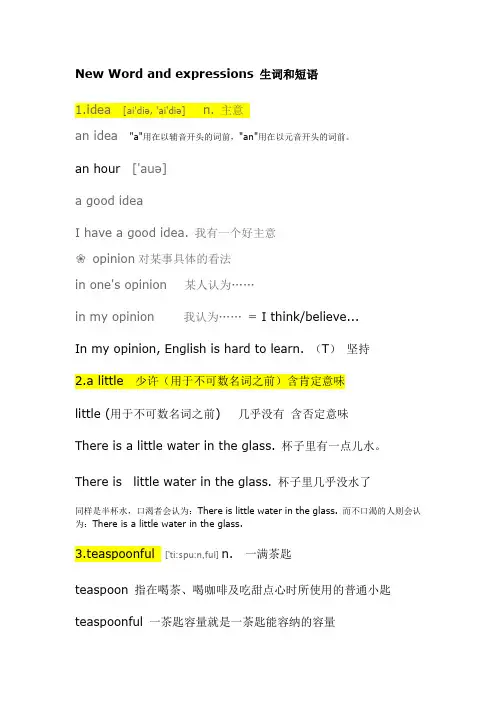
New Word and expressions 生词和短语1.idea [ai'diə, 'ai'diə] n. 主意an idea "a"用在以辅音开头的词前,"an"用在以元音开头的词前。
an hour ['auə]a good ideaI have a good idea. 我有一个好主意❀opinion对某事具体的看法in one's opinion 某人认为……in my opinion 我认为……= I think/believe...In my opinion, English is hard to learn. (T)坚持2.a little 少许(用于不可数名词之前)含肯定意味little (用于不可数名词之前) 几乎没有含否定意味There is a little water in the glass. 杯子里有一点儿水。
There is little water in the glass. 杯子里几乎没水了同样是半杯水,口渴者会认为:There is little water in the glass. 而不口渴的人则会认为:There is a little water in the glass.3.teaspoonful ['ti:spu:n,ful] n. 一满茶匙teaspoon 指在喝茶、喝咖啡及吃甜点心时所使用的普通小匙teaspoonful 一茶匙容量就是一茶匙能容纳的容量a teaspoonful of sugar4.Less adj. (little 的比较级)较少的,更小的1) 规则变化单音节词和少数双音节词,加词尾-er,-est来构成比较级和最高级。
①一般单音节词未尾加-er,-est :tall(高的) taller tallestgreat(巨大的) greater greatest②以不发音的e结尾的单音词和少数以- le结尾的双音节词只加-r,-st :nice(好的) nicer nicest large(大的) larger largest able(有能力的) abler ablest③以一个辅音字母结尾的闭音节(必须是重读音节;最后只有一个辅音字母;元音字母发短元音)单音节词,双写结尾的辅音字母再加-er,-est :big(大的) bigger biggest hot热的) hotter hottest④"以辅音字母+y" 结尾的双音节词改y为i,再加-er,-est easy(容易的) :easier easiest busy(忙的) busier busiest⑤少数以-er,-ow结尾的双音节词未尾加-er,-est :clever(聪明的) cleverer cleverest ;narrow(窄的) narrower narrowest ⑥其他双音节词和多音节词,在前面加来构成比较级和最高级:important(重要的) more important most important easily(容易地) more easily most easily2)不规则变化good/well(好的)/ better bestbad (坏的)/ill(有病的) :/ worse worstold -> older -> oldest老,年龄大-> elder -> eldest排行比较elder sister姐姐much/many(多的) more mostlittle(少的) less leastfar -> farther -> farthest指距离/-> further -> furthest表示程度further study进修学习/further explanation进一步的解释5.a few(= some; several; a small number of) 含肯定意义。
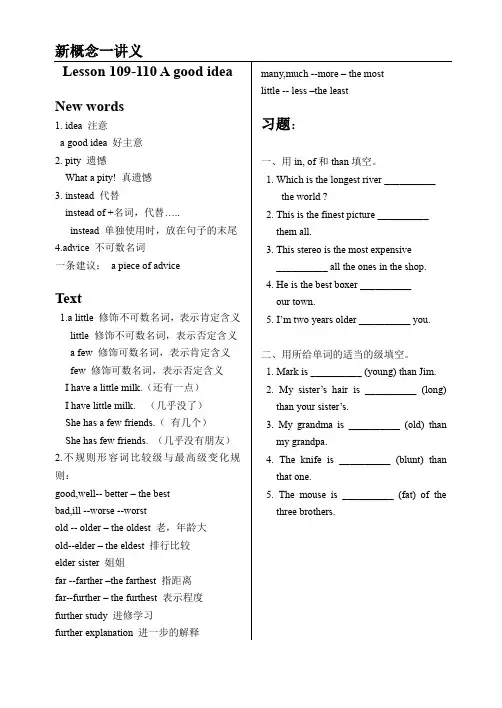
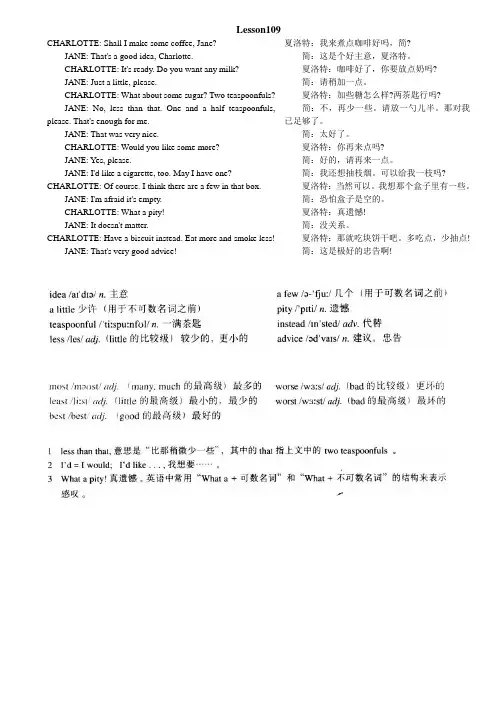
Lesson109CHARLOTTE: Shall I make some coffee, Jane?JANE: That's a good idea, Charlotte.CHARLOTTE: It's ready. Do you want any milk?JANE: Just a little, please.CHARLOTTE: What about some sugar? Two teaspoonfuls?JANE: No, less than that. One and a half teaspoonfuls, please. That's enough for me.JANE: That was very nice.CHARLOTTE: Would you like some more?JANE: Yes, please.JANE: I'd like a cigarette, too. May I have one? CHARLOTTE: Of course. I think there are a few in that box.JANE: I'm afraid it's empty.CHARLOTTE: What a pity!JANE: It doesn't matter.CHARLOTTE: Have a biscuit instead. Eat more and smoke less!JANE: That's very good advice! 夏洛特:我来煮点咖啡好吗,简?简:这是个好主意,夏洛特。
夏洛特:咖啡好了,你要放点奶吗?简:请稍加一点。
夏洛特:加些糖怎么样?两茶匙行吗?简:不,再少一些。
请放一勺儿半。
那对我已足够了。
简:太好了。
夏洛特:你再来点吗?简:好的,请再来一点。
简:我还想抽枝烟。
可以给我一枝吗?夏洛特:当然可以。
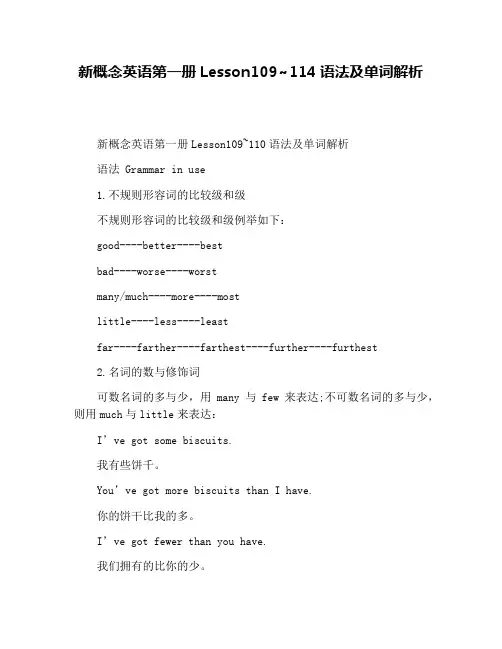
新概念英语第一册Lesson109~114语法及单词解析新概念英语第一册Lesson109~110语法及单词解析语法 Grammar in use1.不规则形容词的比较级和级不规则形容词的比较级和级例举如下:good----better----bestbad----worse----worstmany/much----more----mostlittle----less----leastfar----farther----farthest----further----furthest2.名词的数与修饰词可数名词的多与少,用many与few来表达;不可数名词的多与少,则用much与little来表达:I’ve got some biscuits.我有些饼千。
You’ve got more biscuits than I have.你的饼干比我的多。
I’ve got fewer than you have.我们拥有的比你的少。
I’ve got very few.我有为数很少的(几块)。
I’ve got some chocolate.我有些巧克力。
You’ve got more chocolate than I have.你的巧克力比我的多。
I’ve got less than you have.我所拥有的比你所拥有的少。
I’ve got very little.我所有的为数很少。
词汇学习 Word study1.smoke v.(1)抽(纸烟、烟斗等):He smokes cigars.他抽雪茄。
Eat more and smoke less!多吃点,少抽点!(2)冒烟;冒雾气:She could see a chimney smoking in the nearby village.她能够看到附近村子里的烟囱在冒烟。
Is the fireplace smoking?壁炉在冒烟吗?(3)熏制(鱼肉等):Do you know how to smoke hams?你知道如何熏制火腿吗?2.instead adv.(1)作为替代:I'm tired and can't attend the meeting; you could go instead.我累了,不能去开会了,你能够代替我去。
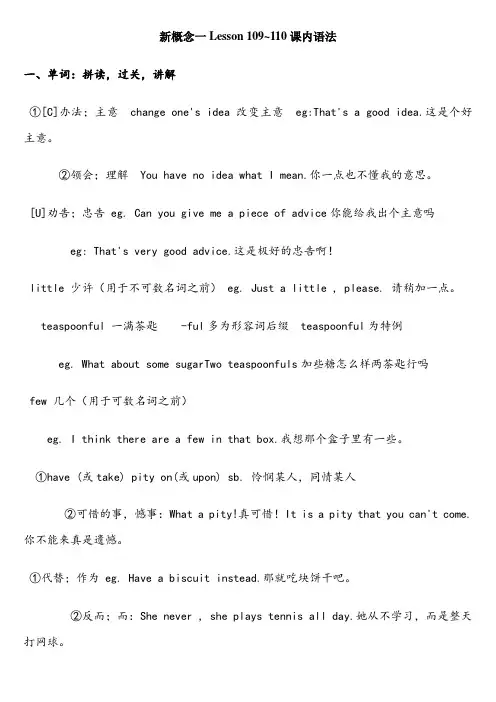
新概念一Lesson 109~110课内语法一、单词:拼读,过关,讲解①[C]办法;主意 change one's idea 改变主意 eg:That's a good idea.这是个好主意。
②领会;理解 You have no idea what I mean.你一点也不懂我的意思。
[U]劝告;忠告 eg. Can you give me a piece of advice你能给我出个主意吗eg: That's very good advice.这是极好的忠告啊!little 少许(用于不可数名词之前) eg. Just a little , please. 请稍加一点。
teaspoonful 一满茶匙 -ful多为形容词后缀 teaspoonful为特例eg. What about some sugarTwo teaspoonfuls加些糖怎么样两茶匙行吗few 几个(用于可数名词之前)eg. I think there are a few in that box.我想那个盒子里有一些。
①have (或take) pity on(或upon) sb. 怜悯某人,同情某人②可惜的事,憾事:What a pity!真可惜!It is a pity that you can't come.你不能来真是遗憾。
①代替;作为 eg. Have a biscuit instead.那就吃块饼干吧。
②反而;而:She never , she plays tennis all day.她从不学习,而是整天打网球。
instead of [相当于介词] 取代;而不……。
“代替”的种种表达instead 单独位于句首或句尾,是副词instead of 用在名词、代词、动名词、不定式、形容词、副词或介词短语前二、课文领读,过关,讲解1、make coffee 沏咖啡2、复习some, any用法 some用于疑问句中,表示邀请或请求,希望得到肯定回答3、be ready for... 为……做准备4、少于……less than5、one and a half+名词复数一个半6、代替 instead of7、我想要 I'd like=I would like 8、真可怜 what a pity9、沏茶 make some tea五、语法。
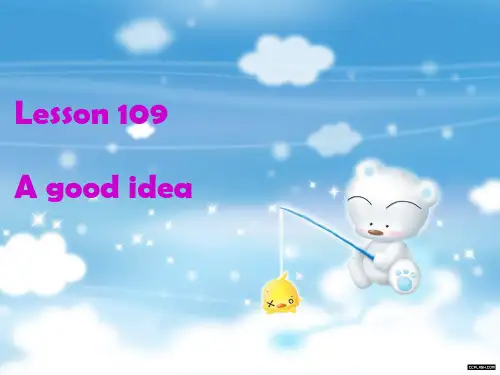
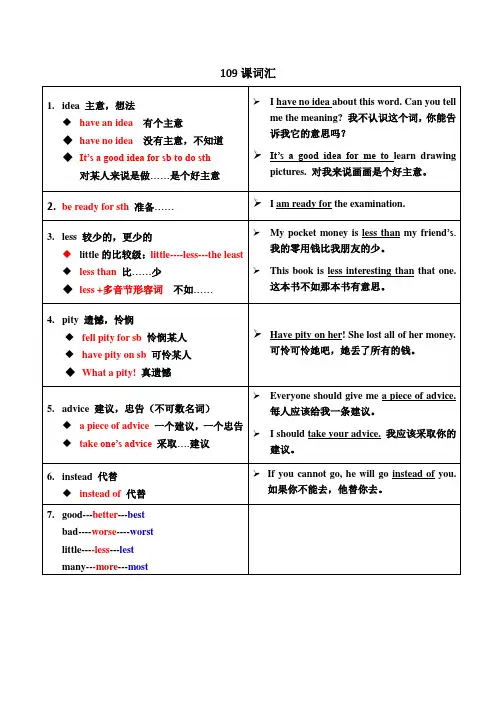
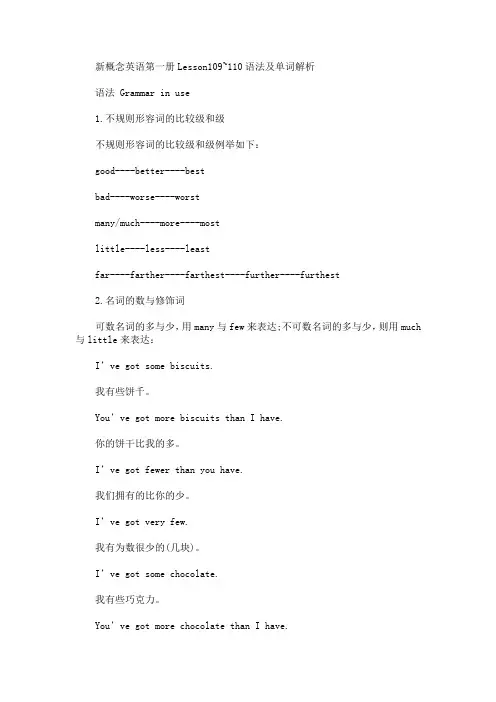
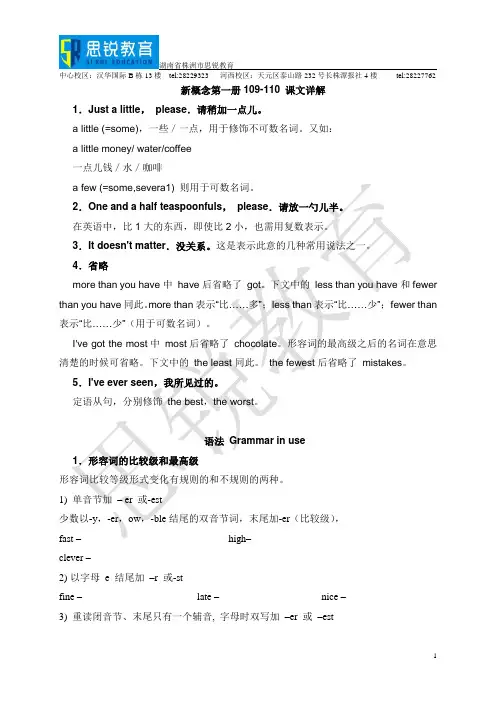
中心校区:汉华国际B栋13楼tel:28229323 河西校区:天元区泰山路232号长株潭报社4楼tel:28227762新概念第一册109-110 课文详解1.Just a little,please.请稍加一点儿。
a little (=some),一些/一点,用于修饰不可数名词。
又如:a little money/ water/coffee一点儿钱/水/咖啡a few (=some,severa1) 则用于可数名词。
2.One and a half teaspoonfuls,please.请放一勺儿半。
在英语中,比1大的东西,即使比2小,也需用复数表示。
3.It doesn't matter.没关系。
这是表示此意的几种常用说法之一。
4.省略more than you have中have后省略了got。
下文中的less than you have和fewer than you have同此。
more than表示“比……多”;less than表示“比……少”;fewer than 表示“比……少”(用于可数名词)。
I've got the most中most后省略了chocolate。
形容词的最高级之后的名词在意思清楚的时候可省略。
下文中的the least同此。
the fewest后省略了mistakes。
5.I've ever seen,我所见过的。
定语从句,分别修饰the best,the worst。
语法Grammar in use1.形容词的比较级和最高级形容词比较等级形式变化有规则的和不规则的两种。
1) 单音节加– er 或-est少数以-y,-er,ow,-ble结尾的双音节词,末尾加-er(比较级),fast –_______ _______ high–________ _________clever – _________ __________2)以字母e 结尾加–r 或-stfine – _______ _______ late –______ _______ nice – _______ _______ 3) 重读闭音节、末尾只有一个辅音, 字母时双写加–er 或–est中心校区:汉华国际B栋13楼tel:28229323 河西校区:天元区泰山路232号长株潭报社4楼tel:28227762 fat ––________ big ––thin –4)以辅音字母加y 结尾变y为i 加–er 或–estearly ––easy ––lucky ––5)little镑,3语法Grammar in use形容词的平级比较级:as…as形容词的比较形式有3种:较高比较级(more expensive, the most expensive);较低比较级(less expensive, the least expensive) ;平级比较级(as expensive as)。
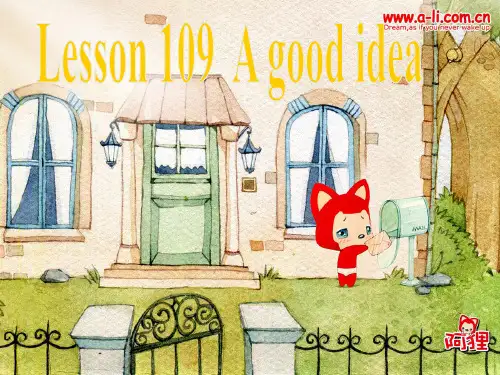
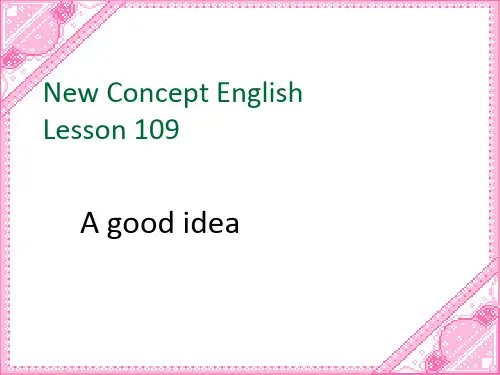
第109—110课【课文理解】一、根据课文回答问题1、where does the dialogue happen?2、Who are they in the dialogue?3、What do they talk about?4、Who likes the cigarette? Is there cigarette in the box?5、What is the piece of advice?6、What does Jane have with her coffee? How much does she want?二、根据要求对所给句子进行提问1、I will make some coffee.( what/make)2、I’d like one and a half teaspoonfuls of sugar(how many)3、That’s a good advice.(how)三、根据所听内容,补全对话(1)A:_____I make ______ coffee? B: That’s a good _______.A: Do you want ____ milk? B: Just _____ ________, please.(2)One and a ______ ____________,please. That’s _______ for me.(3)Would you like _____ ______?(4) I think there are _____ ________ in that box.(5)Have a biscuit ________(6)A: Eat ______ and smoke ______ B: That’s a good _______四、根据要求改写句子1、I’ll make some coffee.(一般疑问句)2、I want some milk. (一般疑问句)3、I’d like some more(一般疑问句)4、There are no cigarettes , so he has a biscuit instead.(合二为一)He has_____ ________ ______ ______ ______ cigarettes.5、The box is empty. It’s a pity! (合二为一)What _____ ______ ______ the ______ ______ ________!五、短语翻译1、煮咖啡2、一个好主意3、两勺半糖4、比我的少5、比他的多6、没有一点在盒子里7、一则忠告8、多吃少抽烟【课文讲解】Betty: Shall I make some coffee, Jane? Jane: That’s a good idea, Betty.煮咖啡、冲咖啡/泡茶、沏茶make coffee make tea引申:black coffee原汁原味的咖啡(green tea绿茶、black tea红茶)white coffee加了牛奶的咖啡sugar白砂糖black sugar红糖rock sugar冰糖美音中叫candy 英音中叫sweet sweetmeat果脯Sweaty:糖果,甜心Sweetie:(儿童用语)糖果n. 爱人,情人;甜的糕饼糖果please.St/sb be ready(to do sth)/(for doing sth)某事/某人准备好了Jane: No, less than that. One and a half teaspoonfuls please. That’s enough for me.(1)多于/高于,more than: There _____ ________ 20 students.少于/低于less than: It’s ________ 20%.(2)enough①作形容(前):There _____ _____ food for everybody.修饰名词②作副词(后):This book is ______ _______ _____ a child _____ read. good enough 翻译:_______ enough time翻译:_______ (3).One and a half teaspoonfuls,please.请放一勺儿半。
新概念英语第1册第109-110课课重点语法一、重要句型或语法1、比较关系本课侧重的是比较级和级的不规则变化,其中也包含三音节及以上的单词要用more和the most的用法。
如:I've got more coffee than you have. / Eat more and smoke less.二、课文主要语言点Shall I make some coffee, Jane? That's a good idea, Charlotte.1)“Shall sb. do...?”,一般用于第一和第三人称,表示征询意见或礼貌请求。
2)make coffee,煮咖啡。
注意make的常用搭配,如:make tea(泡茶)、make the bed(铺床)、make a cake(做蛋糕)。
3)“That's a good idea.”,好主意。
这是个常用句型,用来表示对别人的意见或建议的首肯,经常出现在惯用语搭配考核中。
It's ready.ready,准备好了。
sth. is ready,用来表达什么东西或事情准备好了,如:The coffee is ready.Do you want any milk? Just a little, please.1)要注意want(想要)与like(喜欢)的区别。
want表示的是一时的喜好,而like 表示的是长久的爱好。
2)just a little,只要一点点。
What about some sugar? Two teaspoonfuls? No, less than that. One and a half teaspoonfuls, please. That's enough for me.1)what about,相当于how about,常用来征询意见或建议。
2)注意teaspoonful是个名词,表示满满一茶匙,是由tea、spoon和-ful 构成的。
一、单词:拼读,过关,讲解①[C]办法;主意change one's idea 改变主意eg:That's a good idea.这是个好主意。
②领会;理解You have no idea what I mean.你一点也不懂我的意思。
[U]劝告;忠告eg. Can you give me a piece of advice你能给我出个主意吗eg: That's very good advice.这是极好的忠告啊!little 少许(用于不可数名词之前)eg. Just a little , please. 请稍加一点。
teaspoonful 一满茶匙-ful多为形容词后缀teaspoonful为特例eg. What about some sugarTwo teaspoonfuls加些糖怎么样两茶匙行吗few 几个(用于可数名词之前)~eg. I think there are a few in that box.我想那个盒子里有一些。
①have (或take) pity on(或upon) sb. 怜悯某人,同情某人②可惜的事,憾事:What a pity!真可惜!It is a pity that you can't come.你不能来真是遗憾。
①代替;作为eg. Have a biscuit instead.那就吃块饼干吧。
②反而;而:She never , she plays tennis all day.她从不学习,而是整天打网球。
instead of [相当于介词] 取代;而不……。
“代替”的种种表达instead 单独位于句首或句尾,是副词instead of 用在名词、代词、动名词、不定式、形容词、副词或介词短语前二、课文领读,过关,讲解1、make coffee 沏咖啡2、复习some, any用法some用于疑问句中,表示邀请或请求,希望得到肯定回答,3、be ready for... 为……做准备4、少于……less than5、one and a half+名词复数一个半6、代替instead of7、我想要I'd like=I would like 8、真可怜what a pity9、沏茶make some tea五、语法。
新概念英语第⼀册109-110课课⽂知识点 further notes on the text1.just a little, please.请稍加⼀点⼉。
a little (=some),⼀些/⼀点,⽤于修饰不可数名词。
⼜如:a little money/ water/coffee⼀点⼉钱/⽔/咖啡a few (=some,severa1) 则⽤于可数名词。
2.one and a half teaspoonfuls, please.请放⼀勺⼉半。
在英语中,⽐1⼤的东西,即使⽐2⼩,也需⽤复数表⽰。
3.may i…?我可以……吗?表⽰“请求”或“请求允许”。
4.it doesn't matter.没关系。
这是表⽰此意的⼏种常⽤说法之⼀。
5.省略more than you have中 have后省略了 got。
下⽂中的 less than you have和fewer than you have同此。
more than表⽰“⽐……多”; less than表⽰“⽐……少”; fewer than表⽰“⽐……少”(⽤于可数名词)。
i've got the most中 most后省略了 chocolate。
形容词的级之后的名词在意思清楚的时候可省略。
下⽂中的 the least同此。
the fewest后省略了 mistakes。
6.i've ever seen,我所见过的。
定语从句,分别修饰 the best,the worst。
新概念英语第⼀册109-110课语法知识点 grammar in use1.不规则形容词的⽐较级和级不规则形容词的⽐较级和级例举如下:good----better----bestbad----worse----worstmany/much----more----mostlittle----less----leastfar----farther----farthest----further----furthest2.名词的数与修饰词可数名词的多与少,⽤many与few来表达;不可数名词的多与少,则⽤much与little来表达:i've got some biscuits. 我有饼⼲。
新概念英语单词第一册第109课:好主意idea [a'd] 主意,方法【单词搭配】have no idea不知道 good idea好主意【单词例句】A: Does this skirt suit me?I have no ideaA:这裙子我穿着好看吗?我拿不定主意。
B:I think it suits you very well.B:我觉得它非常适合你。
a little ['lt()l] 少许用于不可数名词之前teaspoonful ['tispun,fl] 一满茶匙【单词例句】A:Add a teaspoonful of sugar, pleaseA:加一满茶匙糖。
B: Don't you think it's too much.B:你不认为那太多了点儿吗?less [les] adj.较少的,更小的a few [fju] 几个(用于可数名词之前)pity ['pt] 遗憾【派生词】pitiful令人同情的 pitiless无情的【单词扩充】regret遗憾 out of pity出于同情【单词例句】A: I'm afraid I can't attend your party tonight.A:恐怕我今晚不能参加你的聚会了。
B:What a pity!B:真遗憾!instead [n'sted] adv.代替【单词扩充】in place of代替 replace取代【单词搭配】instead of代替【单词例句】A: We don't have any beef today. Would you like to have some mutton instead?A:我们今天没有牛肉。
来点儿羊肉代替怎么样?B:OK.I like mutton very much, too.B:好啊,我也很喜欢吃羊肉。
advice [d'vas] 建议,n忠告【单词扩充】advise建议 counsel忠告 suggestion建议【单词搭配】take one's advice接受建议 follow one's advice 接受建议【单词例句】A: CanI offer you some advice?A:我能够给你提供一些建议吗?B: Of course.Wbat do you thinkI should do?B:当然能够了。